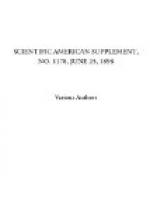The packing of the man’s things is strictly according to regulation, excepting only the single pocket in his knapsack, where he may carry what he chooses, as he chooses. His light canvas haversack is much like the English one, and his round, rather flat water flask is covered with canvas. It is made of tin, and the one I inspected was rusty inside. It would be better if of aluminum. In the haversack is a pannikin with a hinged handle that may be used as a saucepan. Over this fits a tin plate, and when the two are covering one another the handle of the pannikin fits over both by way of handle. It is an excellent arrangement, but should be of aluminum instead of a metal liable to rust. The most valuable part of this haversack is a big tin cup that can be used for a great variety of purposes, including cooking coffee. It is hung loose at the strap of the haversack. Of course each man has knife, fork and spoon, each in a leather case.
The cartridge belt contains 100 rounds, which are distributed all the way around the waist, there being a double row of them. The belt is remarkably light, being woven all in one operation. It is of cotton and partly some material which prevents shrinking or loosening. The belts have stood admirably the test put upon them for the last six days, when it has rained every day, on top of the ordinary heavy moisture usual at sea in the tropics. The test is the more interesting from their having been previously in a very dry country. Officers and men alike unite in praise of this cartridge belt. The particular private whom I was inspecting said he now carried 100 as easily as he formerly carried 50. This belt rests loosely on the hips, without any straps over the shoulders. It is eminently businesslike in appearance. The hat is the gray felt of South Africa, Australia, and every other part of the world where comfort and cost are consulted. No boots are blacked on expeditions of this kind. The men who form in line for guard duty have their tunics well brushed, but that may be due to extraneous assistance.
For fighting purposes, then, the United States private has nothing to keep clean excepting his rifle and bayonet. He carries no contrivances for polishing buttons, boots, or the dozen of bits of accouterment deemed essential to a good soldier in Europe. In Spain, for instance, the private, though he may have nothing in his haversack, will, nevertheless, carry a clumsy outfit of tools for making his uniform look imposing.
Now, as to discipline in the American army I cannot speak at present, for the war is yet too young. It may, however, be worth noting that in this particular regiment, while most complete liberty was allowed the men all the twelve days of the rail journey from San Francisco to Tampa, not a single case of drunkenness or any other breach of discipline was reported. Among the 105 men on this boat there has not in the past seven days been a single case of sickness of any




